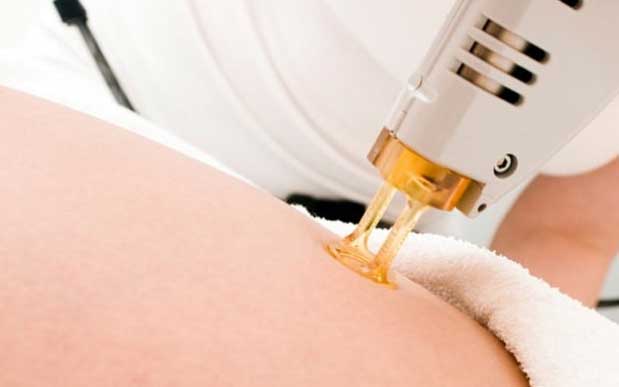
Could laser hair removal give you CANCER?
"Laser hair removal could increase a person′s chances of being diagnosed with cancer, experts have warned.
The smoke produced, which smells like ′burning hair′, contains chemicals that irritate the airways and are known to cause cancer.
Those who are regularly exposed to the smoke, those who perform the cosmetic procedure for example, could be at greatest risk.
Dr Gary Chuang, of the University of California, Los Angeles, warned that the risk increases when the procedure is performed by someone who is not trained adequately.
He said: ′Laser hair removal performed by improperly trained personnel or in an inadequately equipped facility will put both the healthcare workers and patients at risk.′
He added that the procedures should only be performed in spaces with ′an adequate air filtration system and a smoke evacuator′.
Dr Chuang and his team collected hair smaples from two volunteers, sealed the samples in glass jars, treated them with a laser, and captured 30 seconds of laser ′plume′ - a smoky mix of burnt hair and chemicals.
They identified 377 chemical compounds in the smoke, including 20 that are known environmental toxins, such as carbon monoxide, and 13 that are known or suspected to cause cancer.
They included benzene and toluene, according to the study, published in JAMA Dermatology.
Dr Chuang and colleagues also measured the concentrations of very fine particles in the plume that could be easily inhaled.
They found an eight-fold increase in concentrations of the particles compared with room air before the procedure, even when there was a smoke evacuator nearby.
When they turned the smoke evacuator off for just 30 seconds, the particle count increased more than 26-fold.
The researchers conclude that the burning-hair plume released during laser hair treatment should be considered a ′biohazard, warranting the use of smoke evacuators, good ventilation, and respiratory protection.′
Risks are likely greater for practitioners who may work eight hours straight, Dr Chuang observed ? but no studies have yet looked at how much exposure to the burning-hair plume is too much.
′It′s similar to estimating the effect of second-hand smoke - very difficult to do,′ Dr Chuang acknowledged.
Nevertheless, he stressed, ′it′s important to minimize the risks.′
Dermatologist Dr Delphine Lee of the John Wayne Cancer Institute in Santa Monica, California, urges people to ′keep these results in perspective′.
Consider, she told Reuters, ′how these levels compare to everyday exposures to other carcinogen-laden air,′ such as an urban environment with lots of car exhaust or a smoky restaurant.
′There has been no reported epidemic of increased lung disease or other cancer in technicians or health professionals who perform procedures with lasers, people who visit dermatology offices that use lasers, or patients who have frequent laser hair removal,′ Dr Lee noted.
′However, this landmark study alerts us to consider the consequences and further studies are warranted to investigate the risk of exposure to laser hair removal plume,′ Dr Lee said.
Although the actual risks aren′t yet known, Dr Lee advises both practitioners and consumers ′to take some moderate precautions, such as wearing respiratory masks,′ during the procedure."
Related News

4 Superfoods for a Healthy Looking Skin

6 Best Oils for a Naturally Clear and Glowing Skin

Plum goodness for your hair!

This is how many calories your tea and coffee habit is adding to your diet EVERY DAY

Losing Weight in Hot Weather Made Easy

8 Fruits that Burn Fat: Include Them In Your Diet For Great Health Benefits

5 Effective Baba Ramdev Yoga Asanas To Increase Height

Working It Out: The future of work and digital
Most Read
★5 superfoods to combat hair loss
★A platter full of seafood
★12 Benefits of Hair Spa Treatment
★Everyday Medications You Should Never Take When You Exercise
★Healthy eating
★Mans lips exploded after he became 'addicted' to fillers
★Can high heels give you cancer?
★8 Practical Tips to Lose Weight Without Dieting
★Teenagers use social media posts to appear attractive to friends
★Fruitylicious cure for ageing skin
★Best foods for healthy skin
★5 Ways to Dry Herbs
★10 Most Effective Weight Loss Exercises For Torching Fat
★5 Effective Baba Ramdev Yoga Asanas To Increase Height
★Yoga Poses for People with Less Flexible Body
★Natural and healthy effects of Aloe Vera!
★Eat more fruit and veg for a longer life
★Medication Management Tips
★Aerobic training can help reverse ageing
★What dangers are hidden in your pillow?
★Humans evolved to benefit from fermented foods
★How to Make Elderberry Syrup
★Study reveals alarming dangers of anti-ageing jabs
★Growing Propagating and Using Aloe Vera
★5 Skincare resolutions for 2019 that you must keep
★Is there a way to combat greying?
★Dairy and vitamin D supplements protect against bone loss
★Carbohydrates and sugars
★Skinny jeans and big fluffy hoods contribute to back pain
★7 Filling Foods to Keep Belly Fat at Bay
★5 Hot Yoga Poses For Rapid Weight Loss
★Recycling temple waste along the Ganges with Help Us Green
★Smoking and sight loss warning
★Top Foods for Calcium and Vitamin D
★The Best Breakfast Foods for Weight Loss
★Whole-body vibration may be as effective as regular exercise
★Hair removal injuries rocketed NINE-FOLD since 1991
★Face Scrubs and Face Packs
★How To Achieve The Perfect Nail Shape
★The amazing and healthy benefits of meditation!
★The Brilliant Food Combo That Helps You Burn More Fat
★Dandelion Benefits Biodiversity, Soil and Your Health
★Those who consume fruit and vegetables have a 40% lower risk of an incurable lung disease
★Vitamin reverses aging in organs and muscles
★10 Ways To Use Sesame Oil For Beautiful Skin
★Acne sufferers likely to live longer than people with flawless skin
★How you should wash your face?
★Just ten minutes of play a day can help children reduce their risk of developing heart disease and diabetes later in life
★Surgery addict rushed to hospital after his body REJECTED his new nose
★The Diabetes Diet
